Howe Library celebrates Earth Day with books focused on environmental wins! Check out our New Books Spotlight for the latest on this topic and don't forget to play a game of Wingspan while you're nearby!
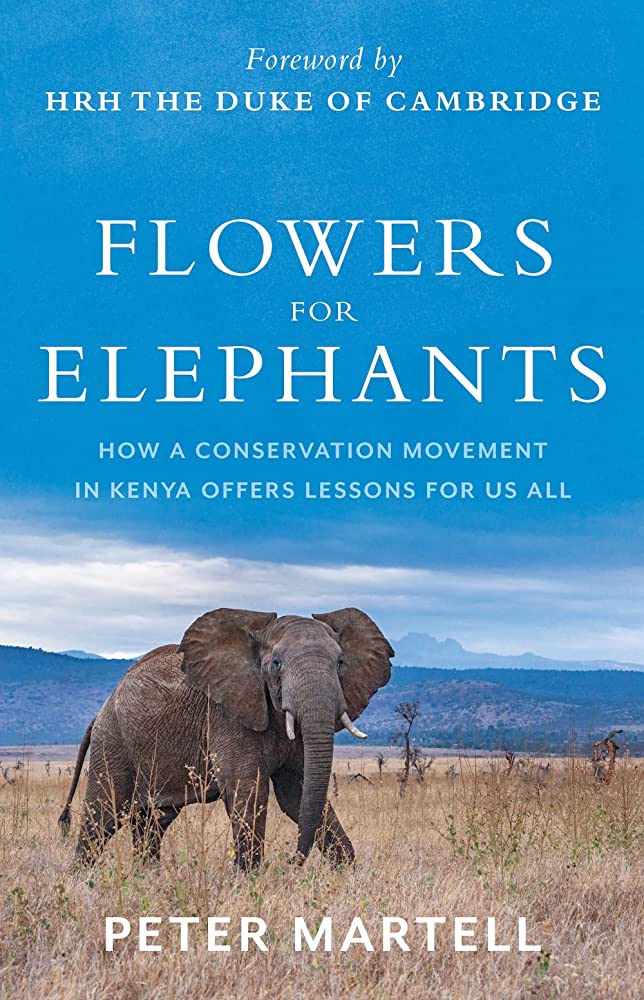
Flowers for elephants : how a conservation movement in Kenya offers lessons for us all by Peter Martell
"When northern Kenyans find elephant bones, they lay down blossoms and branches as a mark of respect, honouring their crucial connection with the wildlife they live alongside. In our changing world, these values are vitally important. For decades, northern Kenya was one step away from a warzone, on the frontlines of climate change and habitat loss. People slept with their shoes on, fearing attack. Wildlife was decimated. Yet, facing the most extreme challenges, people united. What began as a last-ditch effort to save rhinos from extinction sparked a remarkable return of wildlife, with the once-struggling cattle ranch Lewa named a UN World Heritage Site for its outstanding value to humanity. This served as a catalyst for much broader action. Communities created a network of protected lands across an area larger than Switzerland. Through conservation, they built peace, driving social, environmental and political change. From tracking elephants through the bush to gun battles with bandits and treks through Al-Qaeda territory, Peter Martell tells the exciting story of a conservation movement that gives hope. At a time when humanity is reassessing its broken relationship with nature, these communities offer an inspirational blueprint, proving that environmental change does not have to divide, but can bring us together."
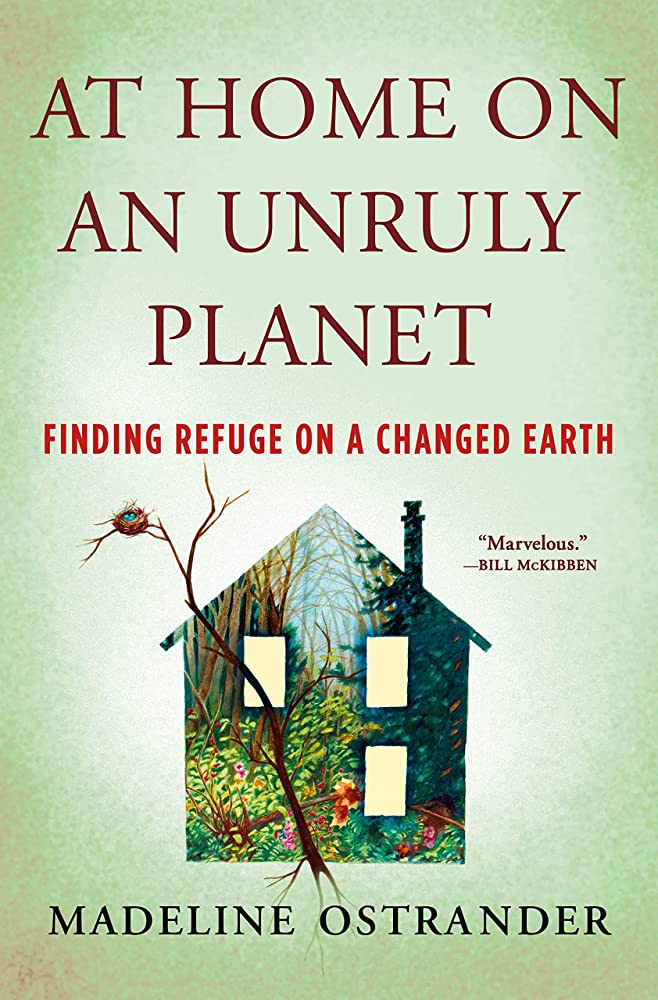
At home on an unruly planet : finding refuge on a changed Earth by Madeline Ostrander
"Once a distant forecast, climate change is now threatening our basic safety and forcing us to reexamine who we are and how we live. What happens when the seasons and rhythms in which we have built our lives go off-kilter. Ostrander offers vivid accounts of people fighting to protect places they love from increasingly dangerous circumstances."
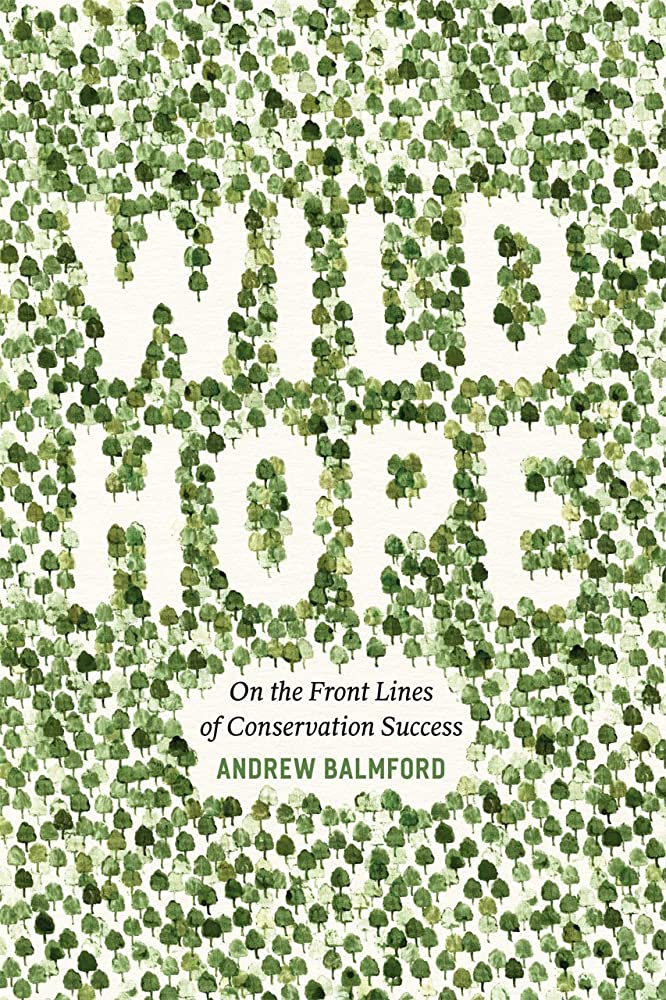
Wild hope : on the front lines of conservation success by Andrew Balmford
"Offers stories of successful conservation around the world, introducing the heroes and foot soldiers, and sharing the new ideas they are generating about how to make conservation work"
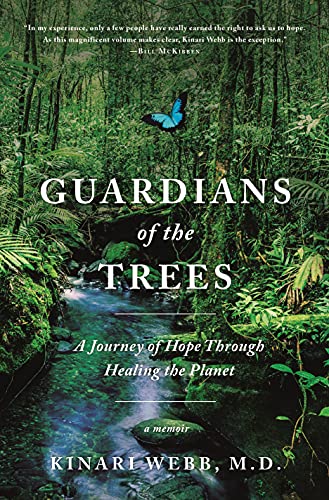
Guardians of the trees : a journey of hope through healing the planet by Kinari Webb
“When Kinari Webb first traveled to Indonesian Borneo at 21 to study orangutans, she was both awestruck by the beauty of her surroundings and heartbroken by the rainforest destruction she witnessed. As she got to know the local communities, she realized that their need to pay for expensive healthcare led directly to the rampant logging, which in turn imperiled their health and safety even further. Webb realized her true calling was at the intersection of medicine and conservation. After graduating with honors from the Yale School of Medicine, Webb returned to Borneo, listening to local communities about their solutions for how to both protect the rainforests and improve their lives. Founding two non-profits, Health in Harmony in the U.S. and ASRI in Indonesia, Webb and her local and international teams partnered with rainforest communities, building a clinic, developing regenerative economies, providing educational opportunities, and dramatically transforming the region. But just when everything was going right, Webb was stung by a deadly box jellyfish and would spend the next four years fighting for her life, a fight that would lead her to rethink everything. Was she ready to expand her work to a global scale and take climate change head on? Full of hope and optimism, Webb takes us on an exhilarating, galvanizing journey across the world, sharing her passion for the natural world and for humanity. In our current moment of crisis, Guardians of the Trees is an essential roadmap for moving forward and the inspiring story of one woman's quest to heal the world"
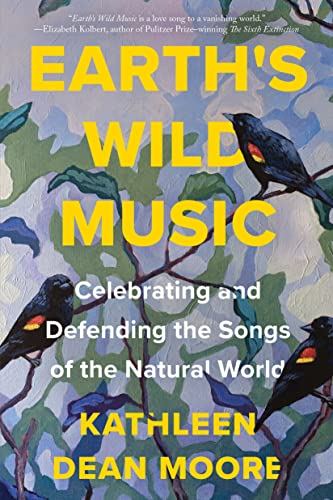
Earth's wild music : celebrating and defending the songs of the natural world by Kathleen Dean Moore
"In her newest collection, Moore selects essays that celebrate the music of the natural world as a reminder of what can be taken from us-the yowl of wolves, tick of barnacles, laughter of children, shriek of falling mountains. Alongside these selections are brand new essays born from the sorrow and iniquity of this new age of extinction, all bearing witness to the glories of this world and the sins against it. Each group of essays moves, as Moore herself has been moved, from celebration to lamentation to bewilderment to the determination to act. In Earth's Wild Music, Moore reminds us that whatever is left of the planet after its pillaging is the world in which those who remain must live. Whatever genetic song-lines, whatever fragments of whale-squeal and shattered harmonies are left, that's what evolution will have to work with. Music is the shivering urgency and exuberance of life on-going. In a time of terrible silencing, Moore asks, who will forgive us if we do not save the songs?"
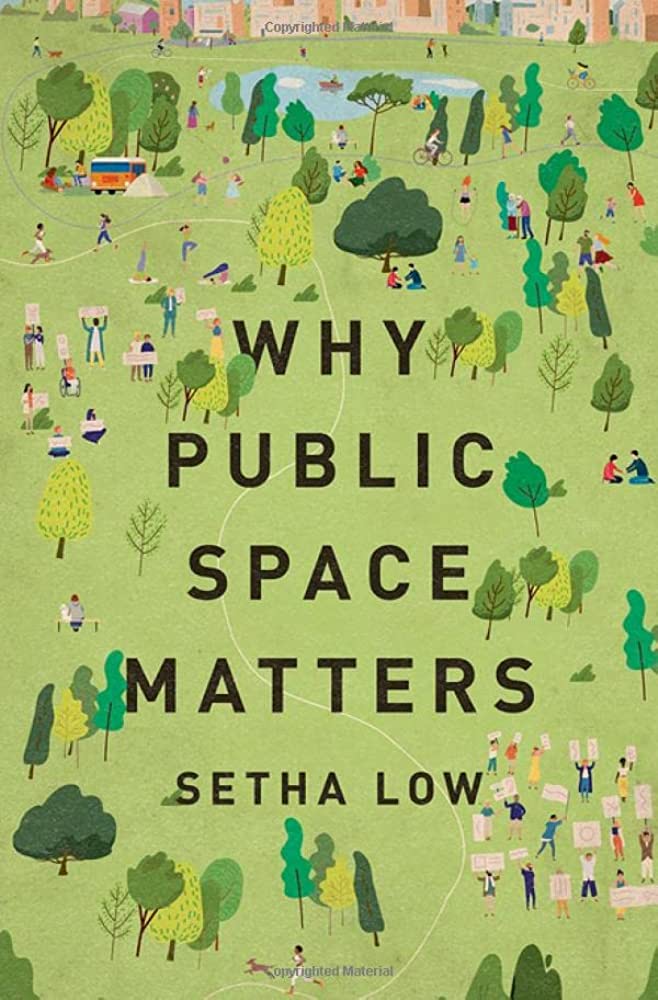
Why public space matters by Setha Low
"I often ask people what their favorite place is in their city or town. What are the places they particularly like and think about as having a special meaning or memory? The answer inevitably is a public space, sometimes a large park to walk, play, or picnic and other times a local square or plaza with shaded paths and comfortable seating. Benches outside a café or on the sidewalk are commemorated with the names of those who spent time sitting with friends and neighbors. In residential neighborhoods, steps in front of an apartment building or library offer gathering places. Open school yards and church grounds are mentioned as favorite places to hold informal markets, clothing swaps, voter registration drives and bake sales to benefit local organizations. Many times, the response is accompanied by a smile and reminiscence about a day at the beach, historic monument, art museum, or an afternoon spent strolling a scenic walkway or bicycling along a nature trail. Young people look for streets and paved areas of parks that provide exhilarating skateboarding or basketball courts and soccer fields where pick-up games happen. Children enjoy lively playgrounds, while caretakers select locations with high visibility and protection from ongoing traffic. Teenagers prefer places they "own" and just "hang" to watch others away from prying eyes. The favorite spots of homeless people are out-of-the-way edges or deep-forested centers of parks and the interstices of buildings and roads. Tourists point to open areas with tables and chairs to sit and watch the ongoing action even with honking cars or densely packed walkways. Some people love busy avenues and marketplaces full of energy to participate in the buzz of urban life, while others prefer quiet alleyways, solitary meadows, and tree-lined boulevards"
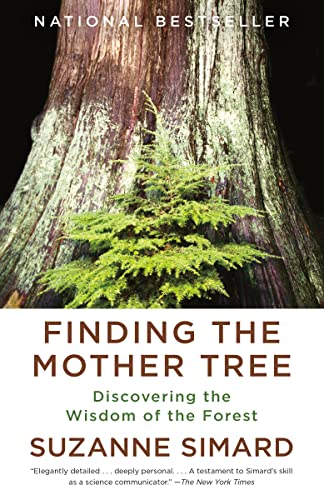
Finding the mother tree : discovering the wisdom of the forest by Suzanne Simard
"Simard illuminates the fascinating and vital truths: that trees are not simply the source of timber or pulp, but are a complicated, interdependent circle of life; that forests are social, cooperative creatures connected through underground networks by which trees communicate their vitality and vulnerabilities with communal lives not that different from our own. At the center of it all, the Mother Trees: the mysterious, powerful forces that connect and sustain the others that surround them. Born and raised into a logging world in the rainforests of British Columbia, Simard writes of her own journey of understanding who we are and our place in the world, and how the Mother Tree nurtures the forest in the profound ways that families and human societies do."
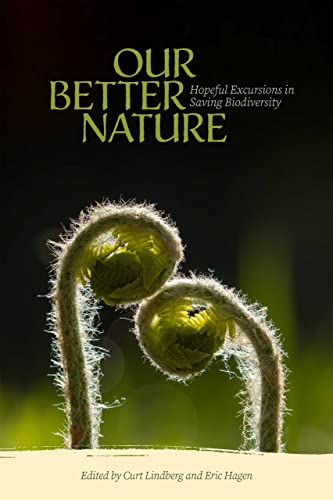
Our better nature : hopeful excursions in saving biodiversity edited by Curt Lindberg and Eric Hagen
"Grounded in experience and science, Our Better Nature: Hopeful Excursions in Saving Biodiversity presents readers with stories, essays, and resources to guide and inspire action in favor of nature everywhere. Dedicated to pioneering biologist and author Edward O. Wilson (1929-2021). A lifelong observer of nature, E. O. Wilson noted what we all must: Of all the challenges facing the planet, the loss of biodiversity and the current extinction crisis are among the gravest. In the face of this, and in light of Wilson's optimism in spite of it, Our Better Nature offers messages of hope."
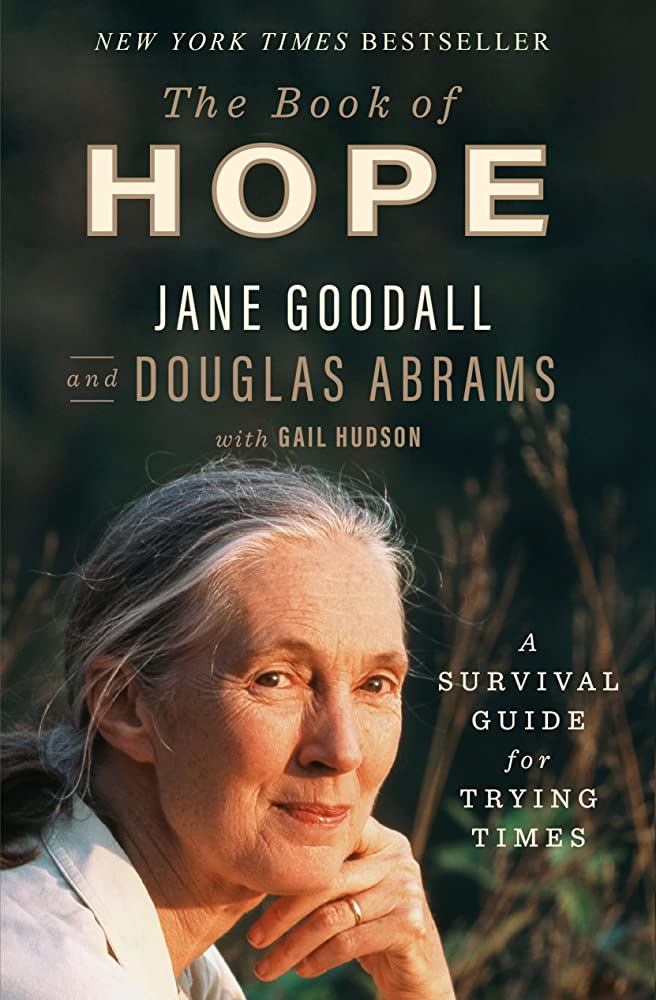
The book of hope : a survival guide for trying times by Jane Goodall, Douglas Abrams with Gail Hudson
"Jane Goodall and Douglas Abrams explore through intimate and thought-provoking dialogue one of the most sought after and least understood elements of human nature: hope. Drawing on decades of work that has helped expand our understanding of what it means to be human and what we all need to do to help build a better world, the book touches on vital questions, including: How do we stay hopeful when everything seems hopeless? How do we cultivate hope in our children? What is the relationship between hope and action? While discussing the experiences that shaped her discoveries and beliefs, Jane tells the story of how she became a messenger of hope, from living through World War II to her years in Gombe to realizing she had to leave the forest to travel the world in her role as an advocate for environmental justice. And for the first time, she shares her profound revelations about her next, and perhaps final, adventure."
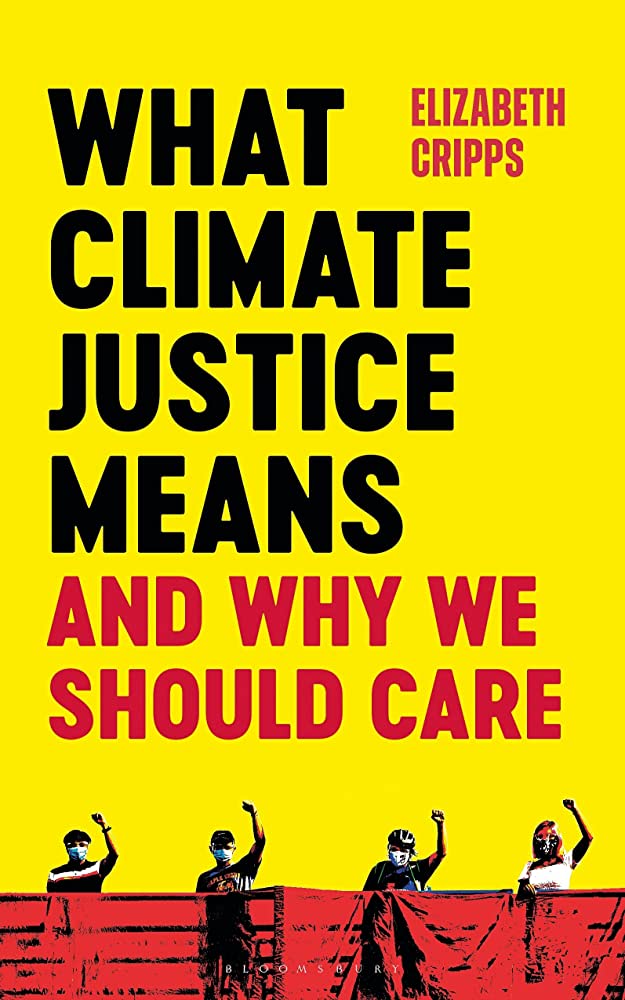
What climate justice means and why we should care by Elizabeth Cripps
"We owe it to our fellow humans - and other species - to save them from the catastrophic harm caused by climate change. Philosopher Elizabeth Cripps approaches climate justice not just as an abstract idea but as something that should motivate us all. Using clear reasoning and poignant examples, starting from irrefutable science and uncontroversial moral rules, she explores our obligations to each other and to the non-human world, unravels the legacy of colonialism and entrenched racism, and makes the case for immediate action. The second half of the book looks at solutions. Who should pay the bill for climate action? Who must have a say? How can we hold multinational companies, organizations - even nations - to account? Cripps argues powerfully that climate justice goes beyond political polarization. Climate activism is a moral duty, not a political choice."
